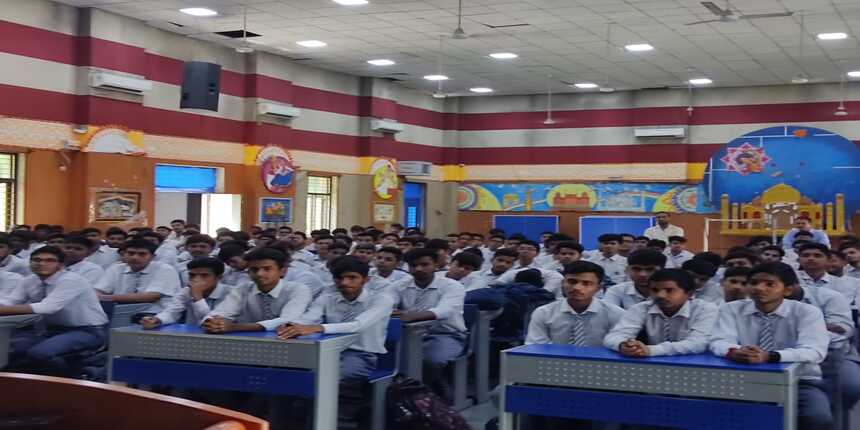CBSE to overhaul internal assessment system, develop framework with British Council
Shradha Chettri | August 28, 2024 | 04:58 PM IST | 3 mins read
CBSE board recently detected ‘inconsistency and potential inflation’ of IA marks. It will repeat the check. The framework will be for Classes 6 to 12.
CBSE 12 Class Free Mock Test
Boost your exam preparation with our CBSE 12 Class Free Mock Test, designed as per the latest exam pattern.
Attempt Now
NEW DELHI: The Central Board of Secondary Education (CBSE) is in the process of overhauling the internal assessment system in schools. The board is working with the British Council to “evaluate” the internal assessment process and develop a “framework for benchmarking and review standards” for Classes 6 to 12.
CBSE Class 12th 2026 QP's: Physical Education | Physics | Accountancy: Set 1 | Set 2 | Set 3
CBSE Class 12th 2026 Answer Key: Physics | Accountancy
CBSE Class 12: Free Mock Test | Formula Sheet: Maths | Physics | Chemistry
CBSE Class 12 (All Subjects): PYQ's | Question Bank | Practice Questions | Sample Papers
The decision was taken during the governing body meeting of the board held earlier in June.
Not just building a new framework, the board will also be conducting capacity-building sessions for teachers and board officials with focus on assessment policy.
In CBSE Class 10, 20 marks of the total 100 in a subject are earmarked for “internal assessment” and the remaining 80 for the year-end board exam. In Class 12, the total 100 is split between practical exams and theory papers in varying ratios. For some subjects, the practical exam carries 30 marks; for others, more. CBSE practical exams are conducted at the candidate’s own school.
CBSE Academic: Why IA marks need review
In June, the CBSE had asked schools to review their internal assessment process, after discovering variations in the theory and practical marks of over 500 schools.
Through advanced Artificial Intelligence (AI) tools, the board detected the variation in the theory and practical marks of around 50% students in some subjects in board exams. Data from previous years’ CBSE results was used for the analysis.
The board will be conducting a similar review next year too, according to an official. If it again finds discrepancies in the CBSE 10th result 2024 and also Class 12, notices will be issued to the schools.
These are among a host of reforms the CBSE board is implementing. Earlier in the year, it announced changes in the framing of Class 12 CBSE question papers in which 50% questions will now be competency-based; it restored the two levels of mathematics after Class 10; and announced that open-book exams will be limited to Classes 9 and 11 for this year.
CBSE internal assessment framework with BCL
The meeting document states, “The members were informed that to address the issue of inconsistency and potential inflation of marks in internal assessments across different subjects and classes, it was proposed that the CBSE in its collaboration with British Council will evaluate internal assessment practices in schools and develop a framework.”
The board has a Memorandum of Understanding with the Council till 2028.
Earlier in 2021, the CBSE and BCL had launched a competency-based assessment framework for maths, science and English for Classes 6 to 10.
Last year, the two organisations collaborated and organised a school education conference with an objective to share knowledge on innovative teaching methods, curriculum, pedagogy, and assessment priorities for 21st century schools as well as the enhancement of computational thinking and digital technology in the classroom.
The GB also ratified the recommendations of the curriculum committee to consider and approve impact analysis of the teacher’s training on competency based assessment in collaboration with a third party.
“Such analysis is crucial for informing policy decisions, refining training programmes and ensuring their effectiveness in enhancing teacher practice and improving students outcomes,” stated the meeting note.
CBSE, British Council collaboration framework
A blended leadership development programme lasting five-six months featuring online sessions, followed by face to face sessions in the UK for 30 participants would be conducted. Five participants would be CBSE officials and the rest from affiliated schools or sister organisations.
“A team of officers from the academic unit and centre of excellence will conduct capacity building workshops for school leaders and coordinators to ensure greater consistency, transparency and fairness in internal assessment practices, aiming to mitigate issues such as inequity in educational outcomes and disengagement among students,” added the meeting note.
It was also decided in the meeting that the framework will be aligned with the Holistic Progress Card (HPC) and National Curriculum Framework for School Education (NCFSE) 2023.
Simultaneously, the board is also known to be working on the effective implementation of HPC for preparatory, middle and secondary stage.
HPC is a 360-degree report of progress, that reflects in detail the progress as well as the uniqueness of each learner in the cognitive, affective, socio-emotional, and psychomotor domains.
Follow us for the latest education news on colleges and universities, admission, courses, exams, research, education policies, study abroad and more..
To get in touch, write to us at news@careers360.com.
Next Story
]Haryana board requires most ‘recall’, UP board most ‘understanding’: NCERT PARAKH on state board questions
NCERT PARAKH’s analysis of private and state board question papers compares difficult levels – easy, medium or hard – and whether questions require rote learning. Find out which boards set the hardest and easiest question papers.
Atul Krishna